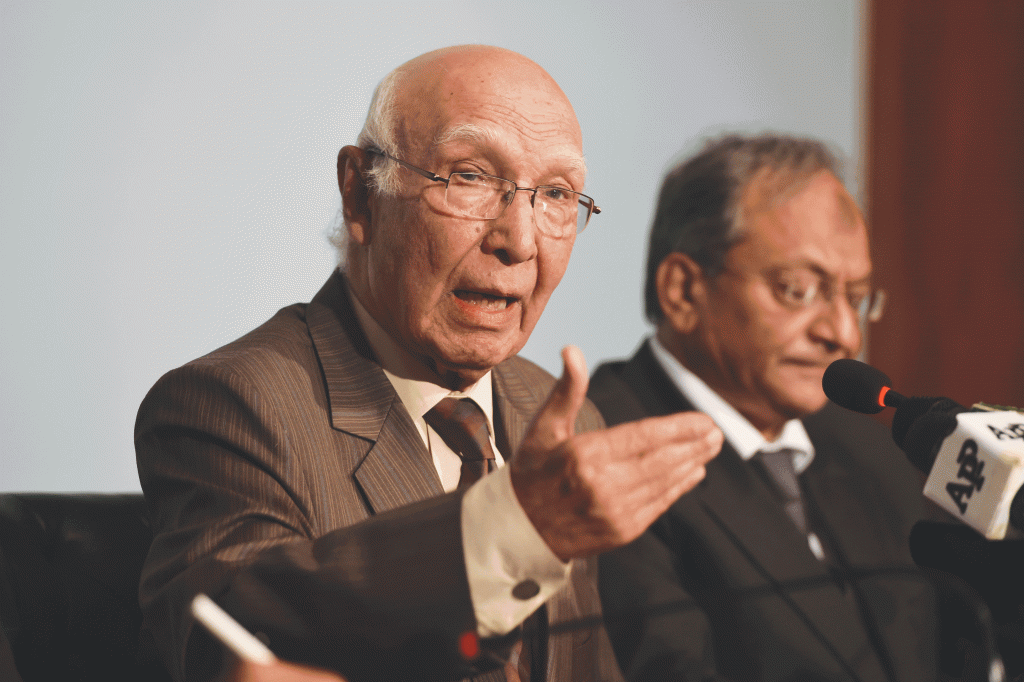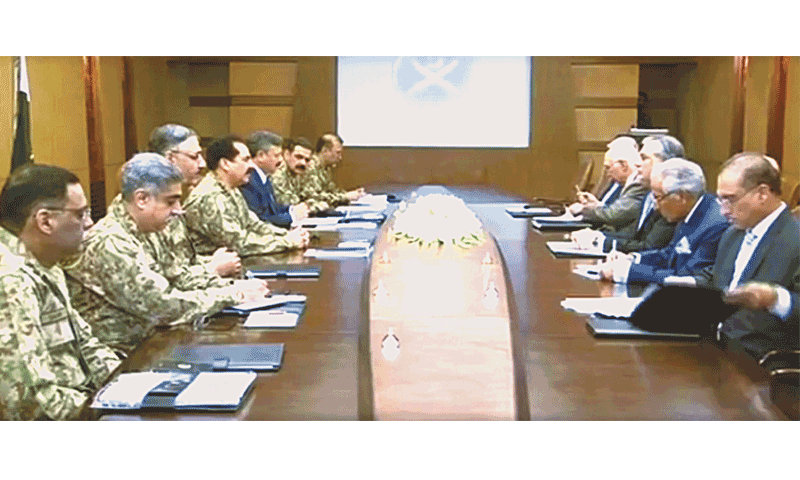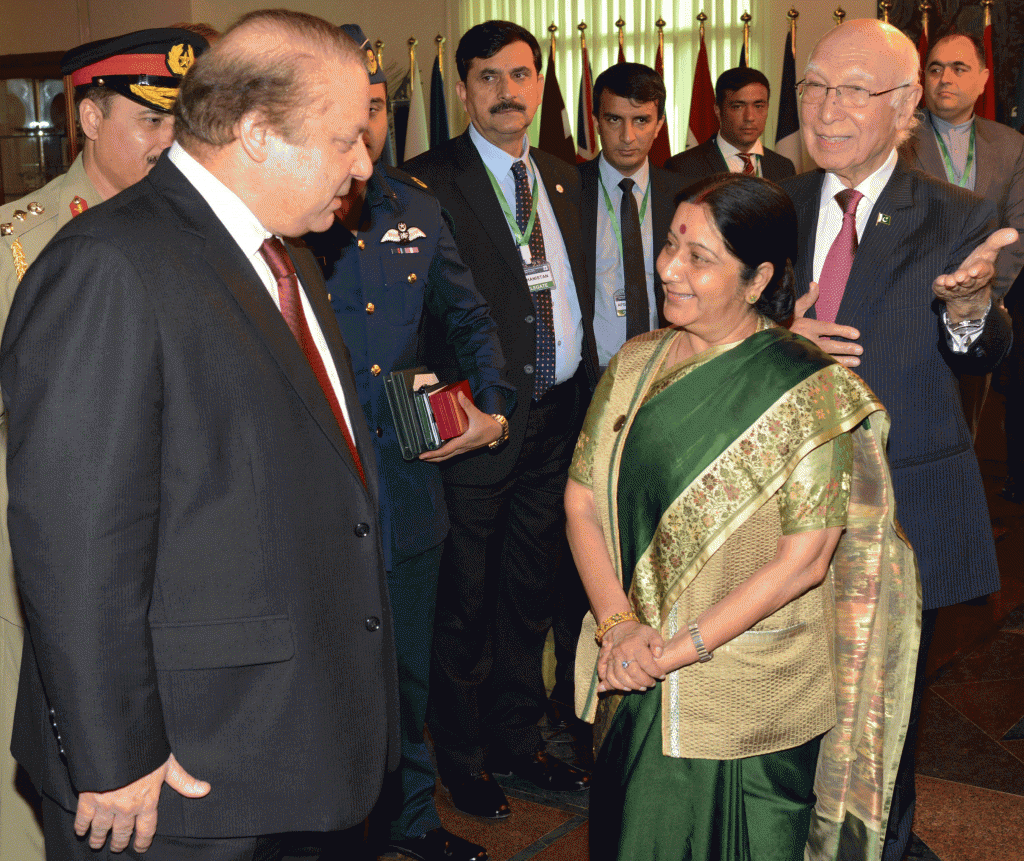The Ten Achievements: Pakistan’s Foreign Policy
By Muhammad Ziauddin | Cover Story | Newsbeat National | Published 9 years ago
The PML-N government faces increasing criticism of its poor record on the foreign policy front. The PM’s Advisor on Foreign Affairs, Sartaj Aziz, recently attempted to present the other side of the picture at a press briefing held at the Foreign Office. He was flanked by the PM’s Special Assistant, Tariq Fatemi, Information Minister Pervez Rashid, Foreign Secretary Aizaz Chaudhry and Information Secretary Imran Gardezi.
In response to the perception that foreign policy has been a problem area in the current dispensation, with the PML-N government opening up disputes with India, Iran and Afghanistan while witnessing a cooling off in its pivotal relationship with the US, Sartaj Aziz listed as many as ten ‘achievements’ of the PML-N government’s foreign policy over the last three years.
He said the ‘path-breaking transformation’ in Pakistan’s strategic partnership with China is the most important achievement, but fell short on specifics when asked about the pay-back plan of the $46 billion Chinese ‘investment’ in CPEC. In fact, he could not explain how the $11 billion earmarked to be spent on Gwadar port and other facilities in and around the port city are to be repaid and what rate of interest the amount carried, if any.
The second major accomplishment listed was what he describes as the ‘enhanced cooperation’ with the Central Asian Republics, naming CASA 1000 and the TAPI gas pipeline as important projects. However, Planning Minister Ahsan Iqbal has already rejected Casa 1000 because of its cost and TAPI is said to be a non-starter because of the turmoil in Afghanistan, which is showing no sign of abating.
Pakistan’s success in obtaining full membership of the Shanghai Cooperation Organization (SCO), was another of Pakistan’s achievements in Sartaj Aziz’s view.
The fifth was the creation of the Quadrilateral Coordination Group for facilitating reconciliation talks between the Afghan government and the Taliban. He thought the droning of Taliban leader Mullah Akhtar Mansour was a breach of Pakistan’s sovereignty and believed it had caused a serious setback to the peace effort. Pakistan contends that the option of military action has been tried for 15 years, with the help of a 130,000-man ISAF force, without much success. The alternative route of a negotiated political settlement cannot yield results within a few months, he maintains.
When he was told that neither Mullah Mansour nor the present chief of the Afghan Taliban was in favour of peace talks and that it was wrong on the part of the government to mislead the people at large by creating an impression contrary to the facts, Aziz said that since there are many factions of the Taliban, differences are bound to remain and even if peace talks begin, there could be some factions opposing the talks.
He said with the successful operation of Zarb-e-Azb, most Afghan Taliban, including the Haqqanis, have crossed over to Afghanistan and were carrying out their campaigns from within Afghanistan. Therefore, it was wrong to accuse Pakistan of continuing to provide sanctuary to Afghan Taliban or to expect Pakistan to have enough influence to bring them to the negotiating table.
He said an agreement has already been reached at the foreign ministers’ level (at the SCO) on the construction of the Torkham border gate. In his opinion, an improvement in border management would also be beneficial to Afghanistan, as the crossing of the border by over 40,000 people on a daily basis, if brought under some kind of control, would also effectively check the movement of terrorists.
He did not think Pakistan would be the loser in the Chahbahar project as the two connectivity projects — Chahbahar and Gwadar — would compete as well as cooperate.
Sartaj Aziz claimed Pakistan’s “continued efforts to ‘‘resolve all outstanding issues, including Kashmir, with India through dialogue’’ as the PML-N government’s fifth achievement. According to him, the restored dialogue was discontinued by India using the ‘‘excuse’’ of the Pathankot incident.
He made it clear that without a resolution of the Kashmir dispute, it was wrong to expect normalcy to return to bilateral relations, but efforts were on to keep tensions from escalating.
The PML-N government’s sixth achievement, according to Aziz, was Pakistan’s success in resuming the Strategic Dialogue with the US in 2013, after the difficult phase in their relationship experienced during 2011-12.
Without defining it as a dispute between the US and Pakistan over the nuclear programme, Sartaj Aziz said Pakistan was strongly committed to the objective of strategic stability in South Asia. “In our interactions, we firmly conveyed to the US that maintaining effective nuclear deterrence was critical for Pakistan’s security and only Pakistan itself could determine how it should respond to the growing strategic and conventional imbalances in South Asia,” he asserted.
He did not believe that our relations with the US have weakened with the F-16 sale off the table and pointed to the three sessions of Strategic Dialogue held by the working groups on energy, economy, education, science and technology.
He said the US tilt towards India should not be taken as some kind of anti-Pakistan move. “The US is building up India as a counter-weight to China and this also involves the rivalry of US and China on the high seas. The US is also wooing India as a potential market for US goods and services.”
He said Pakistan has a role to play in the region and the US recognised this role, but due to the kind of bilateral relations the two had enjoyed during the Cold War as well as during the two Afghan wars, the US perhaps still expected Pakistan to behave like a loyal camp follower.
The seventh achievement of the PML-N government in the last three years has been, according to Aziz, Pakistan’s engagement with the European Union and its member states, both bilaterally and within the EU framework. He specifically mentioned our success in winning GSP+ status in 2014.
Regarding relations with Russia, he particularly mentioned the agreement on the construction of the North-South Gas Pipeline in Pakistan with $2 billion Russian investment and called it a significant milestone.
Sartaj Aziz listed Pakistan’s traditional ties with the Muslim World, which he said were reinforced by strong economic ties and the presence of a five-million strong diaspora as the eighth achievement. He said Pakistan has played an active role in reducing tension and promoting unity within the Muslim Ummah. Pakistan also welcomed the Saudi Arabian initiative to forge a 35-country military alliance to counter terrorism.
In his opinion, President Rouhani’s visit to Pakistan in March 2016 has given a fresh impetus to new opportunities. He was confident that the Iranian gas pipeline project would be completed in due course of time and relations with Tehran would continue to improve.
With Turkey, “Our special relationship has been growing from strength to strength,” he added, as proof of an eighth achievement.
He refers to Pakistan’s ninth achievement as its continued pioneering role in shaping regional and multilateral arrangements for cooperation in SAARC, OIC, D-8 and the Asian Cooperation Dialogue.
He mentioned that Pakistan is expected to host the 19th SAARC Summit in Islamabad in November this year. It is not clear at this juncture whether or not it will take place at all, considering Pakistan’s current relations with India, Afghanistan and Bangladesh.
Pakistan’s Associate Membership of CERN (the European Organisation for Nuclear Research) in September 2015 was cited as a recognition of major achievements made by Pakistani scientists.
Finally, he said, Pakistan continued to play a leading role in the UN and other international fora, on important issues of peace and security, socio-economic development, climate change and human rights.
When asked why the country does not have a full-fledged foreign minister, Aziz said he was for all intents and purposes the foreign minister of the country and never faced any protocol problem while meeting foreign ministers of other countries. He said that he was backed by a foreign office whose officers were second to none.
He had a lame excuse to offer for attending a high level meeting at the GHQ along with the defence and finance ministers, which implied that since the Chief of Army Staff was having a meeting with a US official at the GHQ at about the time, it was thought convenient for all to meet at the GHQ.
The PM’s advisor sounded like a man with a brief. ‘‘Pakistan is pursuing an active foreign policy for protecting its national interests,’’ he said. However, his explanation about who is running the show — the military or the civilians — sounded too good to be true.
When asked how he would reconcile his assertion that Pakistan was not isolated with the recent complaint of the ISPR Chief Lt. Gen. Asim Bajwa, in an interview to German radio, that the world had abandoned Pakistan, Aziz said the ISPR chief was talking in the context of our efforts in the war against terrorism.
Even if the ‘10 achievements’ listed by Sartaj Aziz were taken at face value as evidence of some positive development, they fail to counter the assertion that Pakistan finds itself out in the cold today, with its erstwhile friends and enemies forming regional and global alliances.





